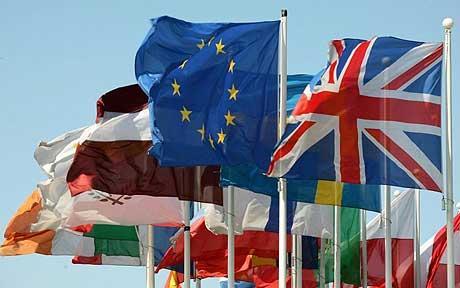 If the EU comes crashing down as a result of the Euro crisis, one thing is certain: the
UK will be at the forefront of re-creating the bloc. Not exactly the way it is now, but not a totally different entity either.
If the EU comes crashing down as a result of the Euro crisis, one thing is certain: the
UK will be at the forefront of re-creating the bloc. Not exactly the way it is now, but not a totally different entity either.
The reasons for this are three-fold, simple and are about Britain’s interests. First, Britain derives benefits from being part of, and determining the rules for, the world’s largest market. When the world is entering a “no-Doha” future, where pressure for protectionism will rise, there is no substitute for access to a relatively open market of some 400 million people. Neither transatlantic trade, commerce with the Commonwealth or links with the BRICS can substitute for it. Check the figures.
Further, Britain needs inter-state relations in Europe to be managed peacefully, through processes of negotiation and arbitration, not based on power and money, as this will mean dominance by Germany and France. This has never been and is not now in Britain’s interest.
Finally, Britain is served by being able to act internationally both bilaterally and through a group of states when dealing with China, Russia, India etc. None of these growing states care much of what the UK thinks and does. The US is looking eastwards and its transatlantic generation – the Clintons, Bushes, Allbrights, and so on – are retiring. A senior British politician told me recently after having visited Beijing that he wasn’t sure the UK Embassy understood much of what was really going on in China but it could certainly do very little about it anyway. European cooperation is not an answer to this but it is an extra string in Britain’s bow, much as the UN Security Council seat is.
These three reasons are why some form of permanent and institutionalised cooperation in Europe is in Britain’s interest; and why Britain should be part of it. You can add more – like the benefits of enlargement, which has helped stabilise hitherto fragile regions from which threats to Britain emanate in the form of drugs, weapons etc. But these three ones are the most important for Britain.
That does not, of course, mean that the form of cooperation needs to be like the EU today. Few people would contest that any future arrangement needs to be more democratic, more liberal, less regulated and less centralised.
Nobody would reinvent the Euro if they could, or the CAP. Making it impossible to expand to Turkey and North Africa, as the current EU has done, should also be avoided. Europe is an ageing continent and needs to change its birth rates or somehow import young people if it wants to survive past 2050.
But the rules on state aid, for example, are great and would always be replicated. Handing over bilateral trade negotiations to a joint body – the European Commission until now – has also been a huge success. To reflect both the similarities and differences with the EU let’s call this new bloc the “EF”, the European Framework.
However, as the new the European Framework will have to emerge as part of a multi-state negotiation, UK preferences will have to vie with French, German, Italian viewspoints. That’s life for anyone but North Korea. So trade-offs are necessary. The key is to have an open debate, possibly including a referendum, on what Britain should be willing to trade – the level of representation, role of Parliament, degree of regulation etc. Let the political parties develop their model and go to the polls on this.
There is an alternative, in fact there are several. Britain can let other European states organise together but stay outside of the club. Or she could try to sabotage the efforts of others. But none of these – variants on a “Swiss strategy” – would secure the interests of an open, free-trading nation with a global consciousness and a world-girdling reach. So even if the EU fails – which is possible but not yet plausible – something similar, something like the European Framework, would likely take its place. And Britain would likely be at the forefront of its design – because it would be in the country’s national interest to so be.






Comments